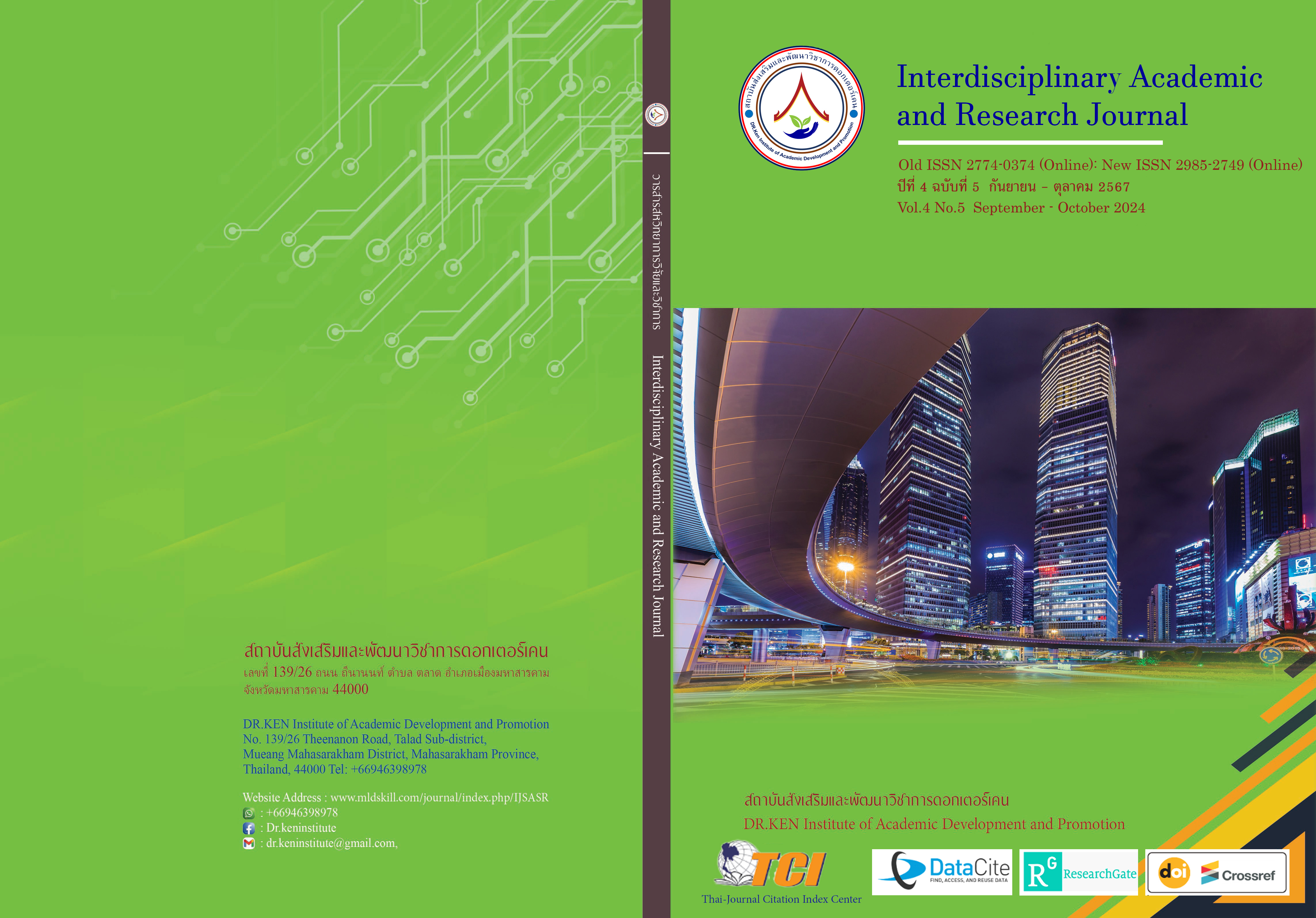A Study of Project Management of Vocational Education Administrators in Kalasin Province Under the Office of the Vocational Education Commission, Ministry of Education
DOI:
https://doi.org/10.60027/iarj.2024.276198Keywords:
Development guidelines; , Project management; , College administratorsAbstract
Background and Aims: The objectives of this research are as follows: 1) to study and compare the project management of administrators of vocational education institutions in Kalasin Province. which is under the Office of the Vocational Education Commission of the Ministry of Education. And 2) to find guidelines for developing project management for administrators of vocational education institutions in Kalasin Province. which is under the Office of the Vocational Education Commission of the Ministry of Education.
Methodology: The sample group in this research consisted of administrators of educational institutions and teachers under the vocational education department of Kalasin Province. Which is under the Office of the Vocational Education Commission of the Ministry of Education. There are a total of 6 colleges with 27 school administrators and 548 teachers and personnel, for a total of 575 people. The sample was randomly drawn using a stratified method. The research tool is a questionnaire that has a 5-level rating scale with a discriminatory power between 0.55 - 0.97 and a confidence value of 0.97. The statistics used in data analysis include percentages, averages, and values, standard deviation.
Results: The results of the research are as follows: (1) project management level vocational education administrators in Kalasin Province have a high level of project management. (2) Project management development guidelines: Project management development of vocational education administrators in Kalasin Province under the Office of the Vocational Education Commission, Ministry of Education, it was found that there are development guidelines as follows: 2.1 Project management development for college administrators: there should be a variety of development processes. Educational institution administrators should analyze basic information as a whole. Analyze policies, plans, and projects of various organizations, including analysis of weaknesses, strengths, and areas that should be developed. for effective planning. 2.2 Project initiation: school administrators should use participatory management principles in planning and setting strategies. Using systems thinking as a brainstorming process. This includes the participation of administrators, teachers, and organizing small group meetings. 2.3 Project implementation aspect: educational institution administrators should play a role in using art to motivate each personnel. By adhering to 5 principles in implementing the project: working with a feeling of willingness, full time, full of people, and full of energy, along with following up on the performance and upgrading the results of the project according to the framework specified in the operational plan. 2.4 Project closing: school administrators should evaluate their performance according to the operational plan for the past year. Including collecting and summarizing projects/activities along with analyzing data systematically in a systematic way.
Conclusion: Development of project management for college administrators there should be various processes for developing the skills of educational institution administrators. There should be an overall analysis of basic information. Analyze policies, plans and projects of various organizations, analyze weaknesses. Analysis of strengths Points that should be developed for effective planning.
References
ประเวศ วะสี. (2545). การสร้างธรรมาภิบาลในขบวนการพัฒนา. กรุงเทพฯ: สถาบันพัฒนาองค์กรชุมชน (องค์การมหาชน).
ไพฑูรย์ สินลารัตน์ และคณะ. (2550). การพัฒนารูปแบบการสร้างและพัฒนาครู เพื่อรองรับกระบวนการเรียนรู้ในการพัฒนาปัญญาบนพื้นฐานแนวคิดไทย. คณะครุศาสตร์ จุฬาลงกรณ์มหาวิทยาลัย:กรุงเทพฯ.
ศศิวิมล อินต๊ะเนตร และคณะ. (2561). การจัดทำคู่มือการบริหารโครงการตามแผนกลยุทธ์ของโรงเรียนแม่แจ่ม จังหวัดเชียงใหม่. Veridian E-Journal, Silpakorn University, 11(2), 2750-2766.
สมคิด พรมจุ้ย. (2550). เทคนิคการประเมินโครงการ. พิมพ์ครั้งที่ 6. นนทบุรี: จตุพร ดีไซน์.
สักดิ์สิวรรณ ทรงสิริวรกุล และ ชุมศักดิ์ อินทร์รักษ์. (2561). การบริหารโครงการของคณะครุศาสตร์ มหาวิทยาลัยราชภัฏ. วารสารการบริหารการศึกษา, 10(2), 919-933.
สำนักงานคณะกรรมการการศึกษาขั้นพื้นฐาน. (2550). แนวทางการนำมาตรฐานสู่การปฏิบัติ.กรุงเทพฯ: โรงพิมพ์ชุมนุมสหกรณ์การเกษตรแห่งประเทศไทย จำกัด.
สุจิตรา บุณยรัตพันธุ์. (2556). ระเบียบวิธีวิจัยสำหรับรัฐประศาสนศาสตร์. กรุงเทพฯ : เสมาธรรม.
อภิชาติ สุปิน. (2554). การบริหารโครงการหนึ่งโรงเรียนหนึ่งนวัตกรรมของสถานศึกษาขั้นพื้นฐาน สังกัดสำนักงานเขตพื้นที่การศึกษาประถมศึกษาเชียงราย เขต 2. วิทยานิพนธ์แขนงวิชาบริหารการศึกษา. มหาวิทยาลัยสุโขทัยธรรมาธิราช.
เอกชัย ปริญโญกุล. (2556). "ประสิทธิผลการบริหารโครงการของมหาวิทยาลัยเทคโนโลยีราชมงคลตะวันออก."รายงานการวิจัย มหาวิทยาลัยเทคโนโลยีราชมงคลตะวันออก.
Kerr, J.F. (1989). Changing the Curriculum. London: University of London Press.
Krejcie, R. V., & Morgan, D. W. (1970). Determining sample size for research activities. Educational and Psychological Measurement, 30(3), 607–610.
Downloads
Published
How to Cite
Issue
Section
License
Copyright (c) 2024 Interdisciplinary Academic and Research Journal

This work is licensed under a Creative Commons Attribution-NonCommercial-NoDerivatives 4.0 International License.
Copyright on any article in the Interdisciplinary Academic and Research Journal is retained by the author(s) under the under the Creative Commons Attribution-NonCommercial-NoDerivatives 4.0 International License. Permission to use text, content, images, etc. of publication. Any user to read, download, copy, distribute, print, search, or link to the full texts of articles, crawl them for indexing, pass them as data to software, or use them for any other lawful purpose. But do not use it for commercial use or with the intent to benefit any business.
















.png)


